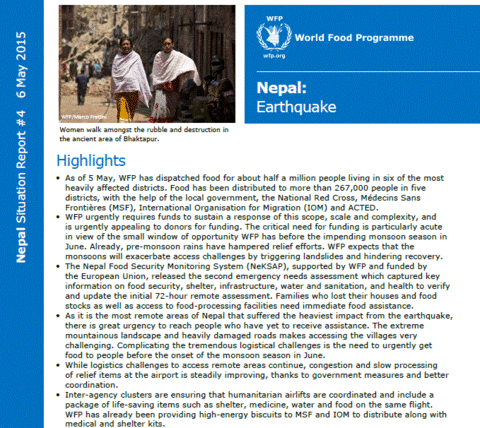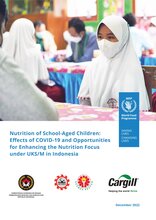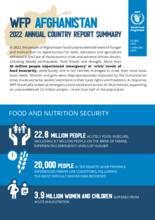
- As of 5 May, WFP has dispatched food for about half a million people living in six of the most heavily affected districts. Food has been distributed to more than 267,000 people in five districts, with the help of the local government, the National Red Cross, Médecins Sans Frontières (MSF), International Organisation for Migration (IOM) and ACTED.
- WFP urgently requires funds to sustain a response of this scope, scale and complexity, and is urgently appealing to donors for funding. The critical need for funding is particularly acute in view of the small window of opportunity WFP has before the impending monsoon season in June. Already, pre-monsoon rains have hampered relief efforts. WFP expects that the monsoons will exacerbate access challenges by triggering landslides and hindering recovery.
- The Nepal Food Security Monitoring System (NeKSAP), supported by WFP and funded by the European Union, released the second emergency needs assessment which captured key information on food security, shelter, infrastructure, water and sanitation, and health to verify and update the initial 72-hour remote assessment. Families who lost their houses and food stocks as well as access to food-processing facilities need immediate food assistance.
- As it is the most remote areas of Nepal that suffered the heaviest impact from the earthquake, there is great urgency to reach people who have yet to receive assistance. The extreme mountainous landscape and heavily damaged roads makes accessing the villages very challenging. Complicating the tremendous logistical challenges is the need to urgently get food to people before the onset of the monsoon season in June.
- While logistics challenges to access remote areas continue, congestion and slow processing of relief items at the airport is steadily improving, thanks to government measures and better coordination.
- Inter-agency clusters are ensuring that humanitarian airlifts are coordinated and include a package of life-saving items such as shelter, medicine, water and food on the same flight. WFP has already been providing high-energy biscuits to MSF and IOM to distribute along with medical and shelter kits.
| Document | File |
|---|---|
| WFP Nepal Earthquake Situation Report #04, 06 May 2015 |
PDF | 1.12 MB
Download
|


